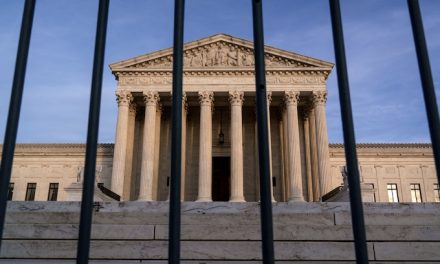House Minority Leader Kevin McCarthy (R-Calif.) said that Republicans opposing his bid for the speakership could lead to Democrats “picking who the speaker is.”
Republicans are on track to retake the House after four years in the minority. If current numbers hold, Republicans will have 222 seats in the House during the 118th Congress.
This could be a problem for McCarthy, who has long hoped to become speaker. With these numbers, McCarthy will be able to spare only a handful of votes next year if he hopes to become speaker of the House.
Now, McCarthy has warned that continuing efforts to oppose him could backfire on Republicans.
“If we play games on the floor, the Democrats could end up picking who the speaker is,” McCarthy said during a Nov. 29 appearance on Newsmax TV’s “Spicer & Co.”
Despite the continuing opposition from his caucus, however, McCarthy seemed optimistic about his prospects.
“I think when you look at the past history, when Paul Ryan ran, he had more people vote against him in the conference, and then they voted for him on the floor,” McCarthy noted, citing Ryan’s first round results in which he received the nomination for speaker over the opposition of 43 Republicans. “We got five more weeks,” he added.
“We want to make sure that everybody has input, but we have to speak as one voice,” McCarthy argued. “We will only be successful if we work together, or we’ll lose individually. This is very fragile, that we are the only stopgap for this Biden administration.”
Conservatives like Reps. Andy Biggs (R-Ariz.), Chip Roy (R-Texas), and Matt Gaetz (R-Fla.), among others, have expressed concerns about McCarthy’s conservative credentials.
At the same time, prominent conservatives like Reps. Marjorie Taylor Greene (R-Ga.) and Jim Jordan (R-Ohio) have thrown their backing behind McCarthy.
Biggs Looking to Oust McCarthy
Biggs has been the most virulent McCarthy critic, mounting a bid to swipe the Republican speaker nomination away from the California Republican.
While McCarthy defeated Biggs for the Republican nomination, winning 188 votes to Biggs’ 31 votes in the closed-door conference meeting, the man who would be speaker still lacks the votes from his caucus to win the top House spot next year. Still, McCarthy did do better in the first round than his Republican predecessor, former House Speaker Paul Ryan (R-Wis.).
Greene, whose backing of McCarthy came as a surprise from the Georgia Republican who often votes with McCarthy’s critics, has tied her backing to McCarthy to the same risk.
She explained that she’s backing McCarthy to head off potential challenges from worse candidates like Rep. Liz Cheney (R-Wyo.).
“It’s very, very risky right now to produce a leadership challenge, especially for speaker of the House, when they are going to open the door and allow Liz Cheney, possibly, to become speaker,” Greene contended.
How Democrats’ Pick Could Win
Though it’s unlikely, the possibility that McCarthy and Greene are alluding to could come to fruition. Specifically, this is because of the way that the race for speaker of the House works.
When parties convene to choose positions like whip, majority or minority leader, and conference chair, only members of the party caucus vote. But for the election of the speaker, the whole House votes.
Theoretically, Democrats could nominate Cheney—who otherwise will be leaving Washington in January after being defeated in her primary—as speaker. If the minority party united behind Cheney, only a handful of Republican defections could grant Cheney the gavel.
Rep.-elect Harriet Hageman (R-Wyo.), who beat Cheney for the Republican nomination in Wyoming’s single House district, has also thrown her support behind McCarthy, citing the risk of Cheney or another Republican odious to the caucus seizing the speaker’s gavel.
Though there has never been a speaker of the House who was not a sitting, elected member of Congress, the Constitution does not mandate the speaker be such.
Because of this some Trump allies, including Gaetz most prominently, have pushed for naming President Donald Trump speaker.
The same could happen with Cheney if she were nominated by Democrats.
Though Jordan’s name has been tossed around as a contender, the Ohio Republican is backing McCarthy and seems uninterested in the top post.
Because Republicans will be working with a razor-thin caucus, and because many in the party are critical of McCarthy, Republicans have no heir apparent for the spot at the moment.
It is also unlikely that Democrats would attempt such a move.
Traditionally, the minority party nominates their pick for minority leader—likely to be Rep. Hakeem Jeffries (D-N.Y.) for Democrats—to the spot. There has been no explicit indication that Democrats will attempt to break this tradition next year.
The speaker’s election will be the first order of business when the new Congress sits on Jan. 3, 2023. No other House business can proceed until a speaker has been chosen.
Copyright The Epoch Times – Reprinted with permission



















I don’t like McCarthy and I doubt Liz Cheney will be elected in his place.
Still, I don’t think Biggs has a chance and I’m sorry that it’s like that. Conservatives seem to have no influence anywhere, not even in their own party. The only way to reclaim this party would be to start at the local level but I don’t see that happening.
AND By the time we shift from the local level, TO the federal level, it may be just too late..
Bypass the Federal government altogether: reclaim the GOP at the state level via an Article V Convention of States.
Something i’ve been hoping happens for years.. STILL WAITING.
McCarthy is one of those go along to get along RINOs. I would rather see Steve Scalise or Jim Jordan as Speaker. We are in a Cold War with the enemy within, the Democrat Crime Organization and need someone with a titanium spine, not a linguini backbone as Speaker.
My vote goes to jordan..